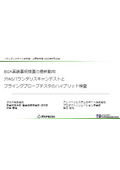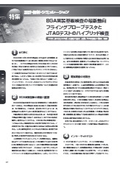It is a board inspection device capable of ultra-fast in-circuit testing at a top-class level in the industry.
We have completely revamped the platform compared to the conventional model, increasing the probe movement speed by up to 50% and dramatically improving contact position accuracy. With a new high-precision, wide-range measurement system that offers great flexibility and a groundbreaking 4-head 6-flying probe mechanism, we can significantly reduce inspection costs and enhance quality in the assembly process, regardless of substrate variety or production volume. ★You can bring your own substrates for evaluation tests at our demo rooms in Okayama headquarters and Tokyo branch★ We can conduct a series of tests, including creating inspection programs, inspecting using actual substrates, and summarizing evaluation results. If you are interested, please apply through the 'Contact Us' section below.
Inquire About This Product
Related Videos
basic information
To ensure that electronic devices function correctly, the electronic circuit board within the device must operate normally. The electronic circuit board becomes operational when electronic components are correctly mounted on the printed circuit board (PCB) and power is supplied. The process of contacting a specialized probe to the electronic circuit board, which has electronic components mounted on it, and applying a minute electrical signal for testing is called In-Circuit Testing (ICT), and the device used for this testing is referred to as an In-Circuit Tester. This method allows for the inspection of "connection reliability between electronic components and the board," "the values of individual mounted electronic components (such as resistors and capacitors)," and "diode polarity," without imposing unnecessary loads on the board itself. It is also known as MDA (Manufacturing Defect Analyzer). Main inspection contents: ● Solder shorts and opens ● Pattern disconnections ● Missing components ● Incorrect component values ● Reverse insertion of polarized components ● Lifted leads of ICs and connectors ● Operation confirmation of digital transistors, optocouplers, and Zener diodes ● Other simple function tests
Price range
Delivery Time
Applications/Examples of results
【Adopted Industries】 EMS, EMDS companies Semiconductor manufacturing equipment Communication infrastructure and servers Automotive, aircraft, and marine Medical devices Industrial machinery and robots FA machine tools Power generation and power systems 【Use Cases】 ■Inspection of mass-produced items Connected to loaders/unloaders for automated/unmanned inspection even in large lots ■Inspection of multi-variety small quantity substrates No need for dedicated fixture production costs; easy identification of defective areas ■Inspection of prototype substrates Function tests responsive to design changes (applying voltage to the substrate to confirm circuit operation (ON/OFF) and measure direct current) ■Implementation confirmation inspection during model switching Verification of the mounting program for the first lot and checking for setup errors during model changes ■Defect analysis inspection Inspection of substrates that failed functional tests and defect analysis of substrates that malfunctioned in the market We have a proven track record of being utilized in various other applications as well. For more details, please contact your sales representative.
Line up(2)
| Model number | overview |
|---|---|
| APT-1340J | Standard model |
| APT-1340J-A | Inline model (with automatic conveyor transport) |
catalog(16)
Download All Catalogs![Accelerating Inspection of Flying Probe Testers Using Deep Reinforcement Learning [Ehime University Collaborative Research Material]](https://image.mono.ipros.com/public/catalog/image/01/b78/706831/IPROS8285943113191609983.jpeg?w=120&h=170)

![Accelerating Inspection of Flying Probe Testers Using Deep Reinforcement Learning [Joint Research Material with Ehime University]](https://image.mono.ipros.com/public/catalog/image/01/844/760295/IPROS14771536501121226558.jpeg?w=120&h=170)

News about this product(26)
Company information
Founded in 1894 as a textile company, Takaya Textile expanded and established its electronics division in 1966, beginning the assembly of transistor radios. Currently, in addition to contract manufacturing services (EMS) related to electronic devices, the company actively manufactures and sells in-circuit testers (printed circuit board inspection devices), RFID-related equipment (technology that enables information exchange through short-range wireless communication from IC information tags), and engages in IT consulting and system solutions, among various electronics businesses both domestically and internationally. We will continue to evolve as a corporate group that contributes to the development of society, with textiles and electronics as our two pillars.


















